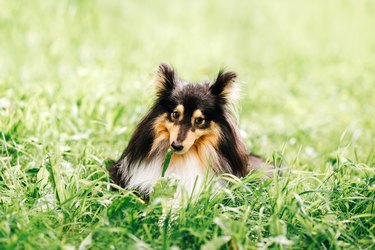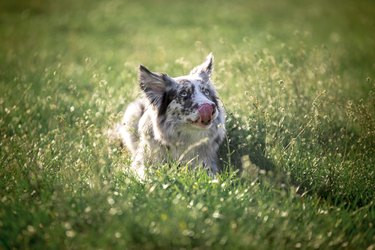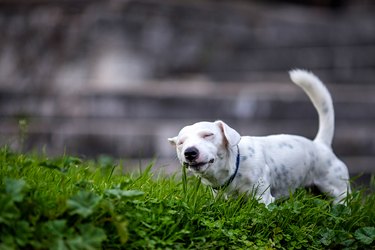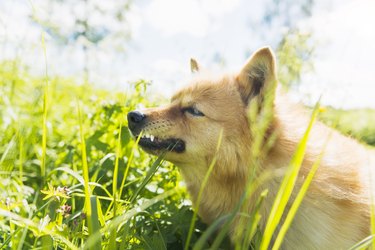
Have you ever seen your dog eating grass? Lots of canines do it, but why? Most people think dogs ingest grass to induce vomiting when they're feeling ill, but sometimes it seems like dogs just munch a little and move on.
It turns out there's no one, straightforward answer, but there are a few theories.
Video of the Day
Video of the Day
Eating grass to induce vomiting
Most people assume that their dog eats grass because they already feel sick and need to make themselves throw up to feel better, but apparently, that's not the case much of the time. A 2008 study published in Applied Animal Behavior Science shows that only 9% of over 1500 dogs examined appeared ill before eating grass, and only 22% actually vomited after eating grass. So, while some dogs may eat grass to induce vomiting as a way to ease an upset stomach, others may simply throw up because they just ate grass.

Wild dogs, and the modern dog’s diet
Wild dogs and our dog's ancestors would get all of their nutritional needs met each time they successfully hunted and killed an animal. These dogs would eat just about every part of their prey, not just the muscle and organs, but also the stomach contents of that animal. Because much of their prey included grazing animals that lived almost entirely on diets of grass, these bellies would be full of the stuff, and hungry dogs would get their fill of all the vitamins, minerals, and nutrients that come along with it, as well as carbohydrates like fiber. Most domesticated dogs today get all of their food from one source, and while commercial dog food is balanced, many people believe that seeking out grass may be an instinctual behavior for dogs, dating back to their earlier days. This grass-eating behavior could be expressed to meet the nutritional needs that grass offered them, or it could be a behavioral instinct to scavenge for food, as their ancestors did.
That said, if your dog does have a nutritional deficiency, then it's definitely possible that they're grass-eating habits can be attributed to getting those needs met. Commercial dog food is balanced to make sure your furry friend is getting all the nutrients they need, but if you're feeding your dog a homemade diet, or if you just think your dog's food isn't cutting it, you should speak with your veterinarian about which measures are needed to get your dog on a more balanced diet.

Eating grass for fun
Still, not all dogs eat grass for reasons related to their digestive systems—some dogs just enjoy grass! They might enjoy the taste, or how it soothes their stomachs, or perhaps it makes their bathroom times a bit easier, or maybe it's just refreshing—whatever the case, there are plenty of reasons why a dog might enjoy eating grass. Grass, at least when it's green and healthy, is made up of about 85% water, so for a thirsty dog, chomping on a few blades may just offer their palate the hydration that it needs.
Eating grass can also provide mental stimulation for dogs as they're naturally inclined to sniff out and rummage for their food, so eating grass can be enriching and satisfying for that reason. Dogs may eat grass to essentially entertain themselves, so if your dog seems like they're eating out of boredom, you can offer them a toy, some exercise, or another form of mentally stimulating activity that they enjoy.
Grass is also roughage, and can make a great source of fiber that's seemingly plentiful, depending on what your surroundings are like. Fiber deficiency in any diet can result in constipation, irregular bowel movements, and fluctuating blood sugar levels, and if your dog is experiencing any of these symptoms they may seek out a high-fiber treat to help themselves feel better.

Is grass safe to eat?
Grass is rich in fiber, vitamins, and minerals, so it's not necessarily unsafe in its natural state, but it's also not the best snack for dogs, especially if they're eating grass in residential areas. This is mainly because many lawns are treated with pesticides and fertilizers, which can be harmful to dogs. If your dog enjoys eating grass, try to keep them in your own yard, and be sure to avoid treating your lawn with pesticides and other poisons.
Grass eating can become an issue if it's part of a behavioral problem, like anxiety, or an obsessive and compulsive disorder. Pica is a medical condition that causes some people and animals to eat non-food items, like dirt. If your dog is eating a lot of grass, or if they seem to seek it out obsessively, talk to your veterinarian for a diagnosis and possible treatment plan. Sometimes, pet parents can offer their canine companions simple distractions to keep them mentally engaged, like chew toys or snuffle mats, or embark on a force-free dog training journey to get their self-esteem raised and their minds occupied.
If you'd like to prevent your dog from eating grass, it's best to not leave them unattended in a grassy area. During walks, try to engage your pet by using positive reinforcement training that will redirect their attention to you each time you see them take a nibble of grass. If you think your dog's grass-eating can't be chalked up to normal dog behavior, consult your veterinarian to rule out underlying issues that may be causing them to overeat.

The bottom line
Eating grass is a common behavior among dogs, and there are many reasons why dogs eat grass. This can include soothing your dog's stomach, adding fiber to their diet to help them pass stool, instinctual drives, and seeking mental stimulation. Eating grass is safe so long as the grass hasn't been treated with poisonous pesticides that could injure your dog, and as long as your dog isn't overeating grass due to a behavioral issue.